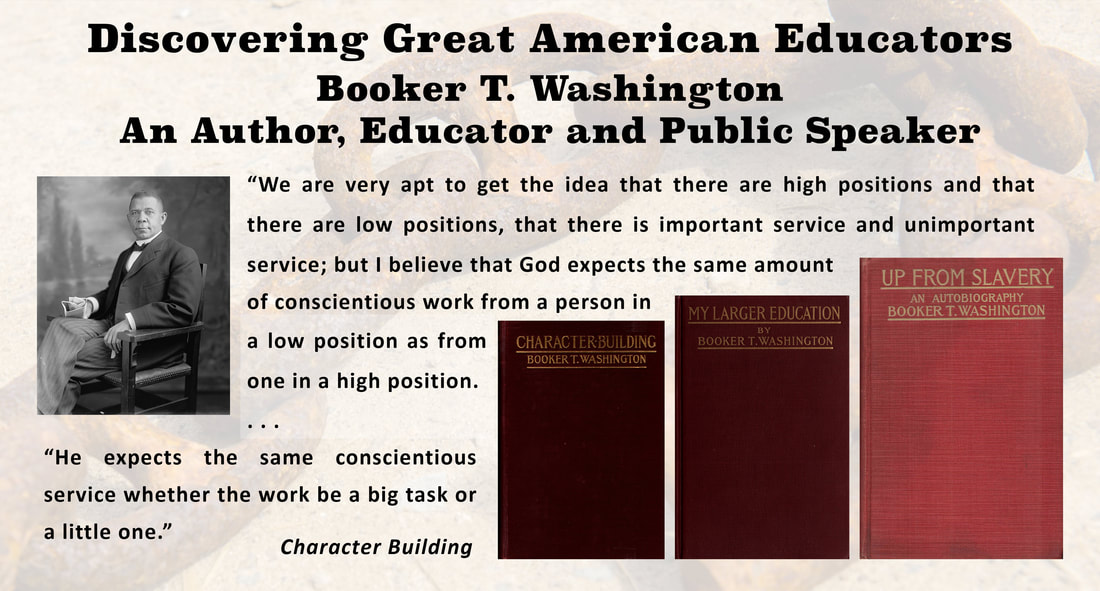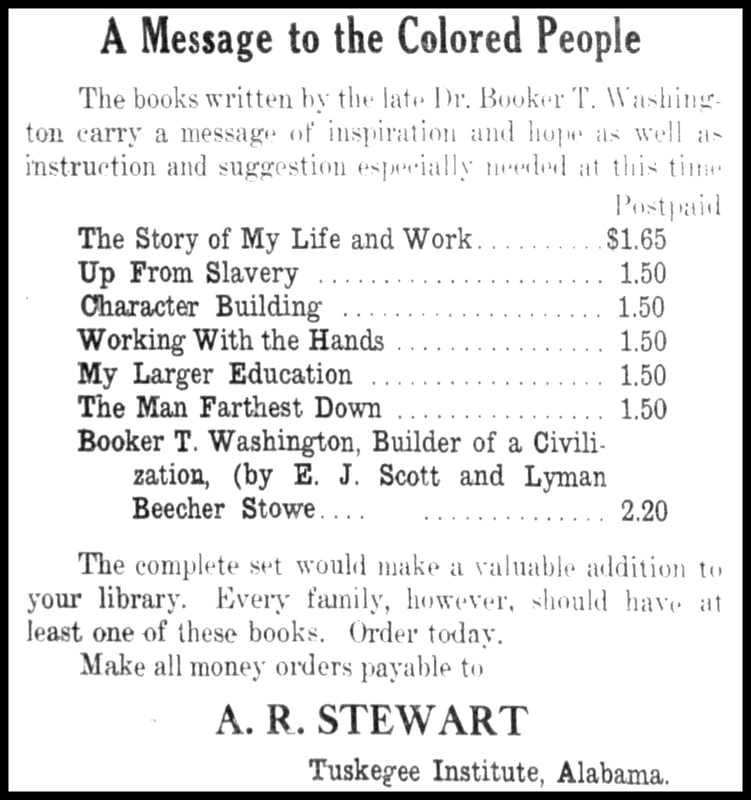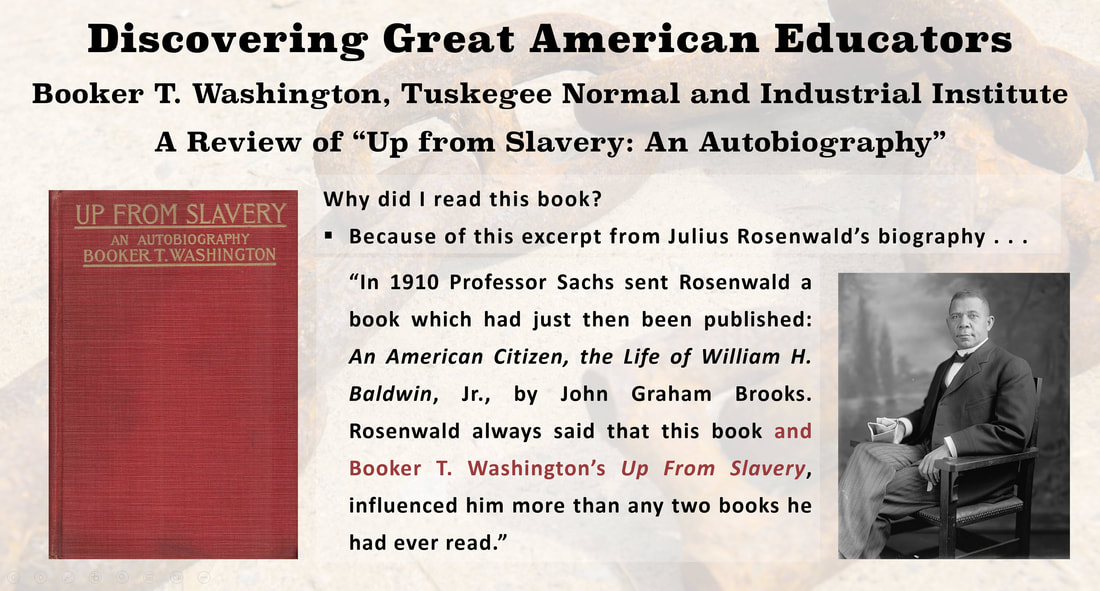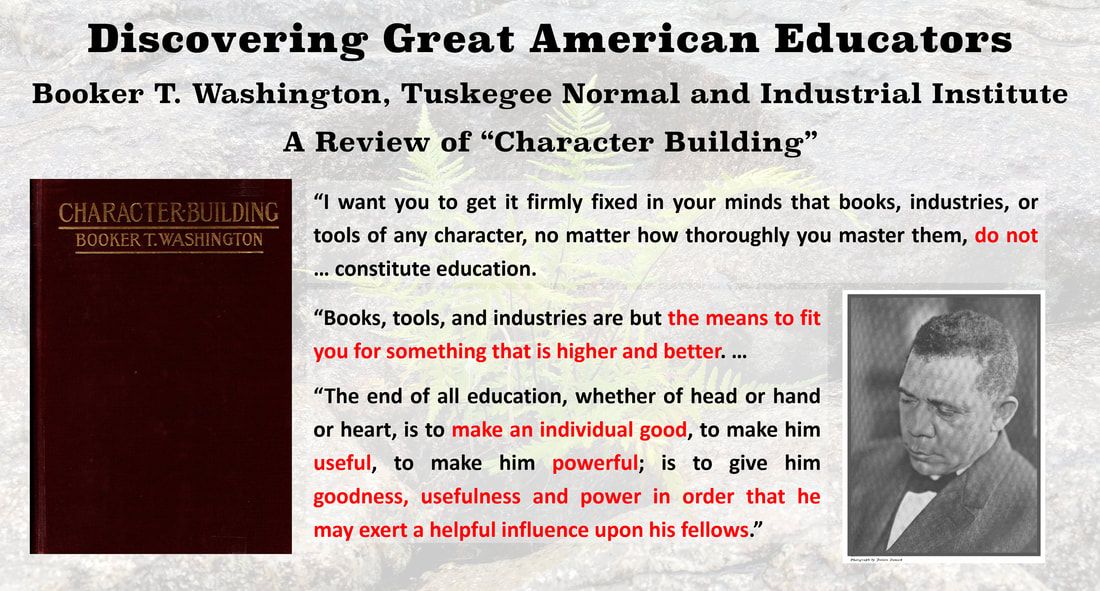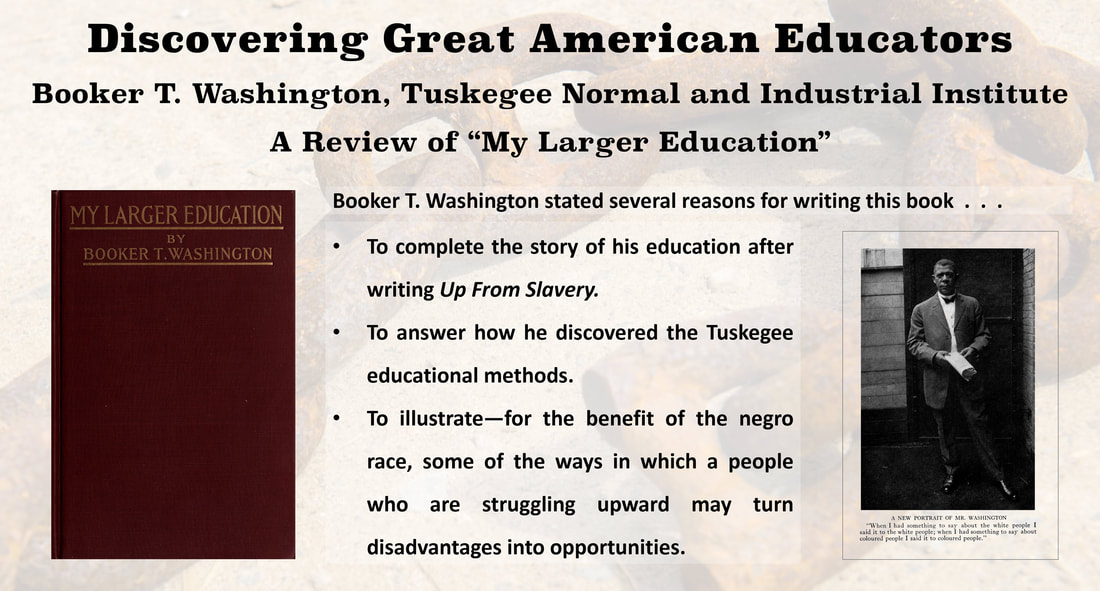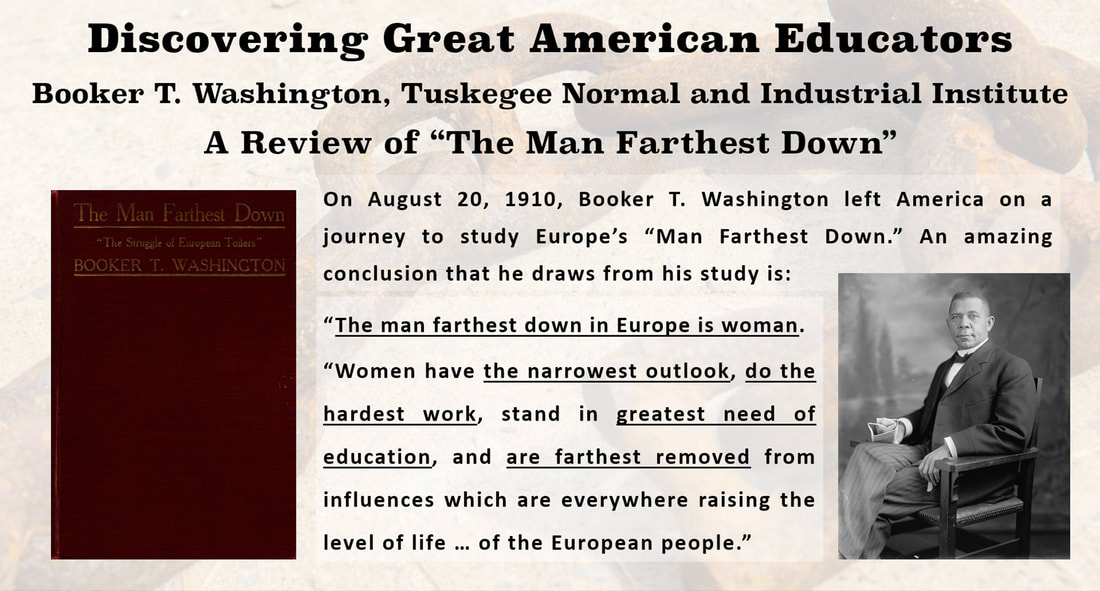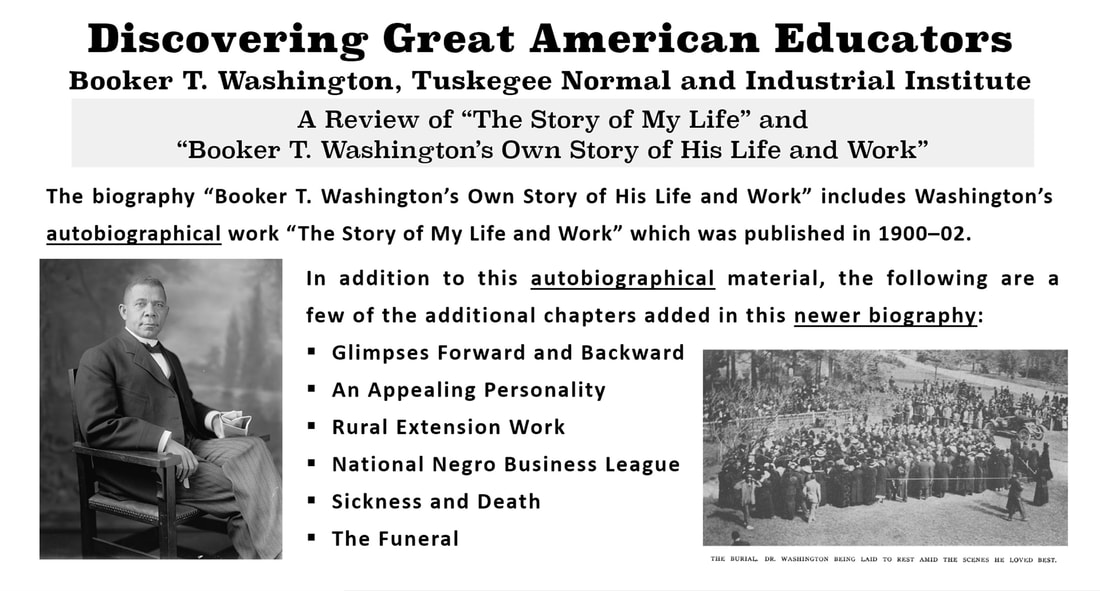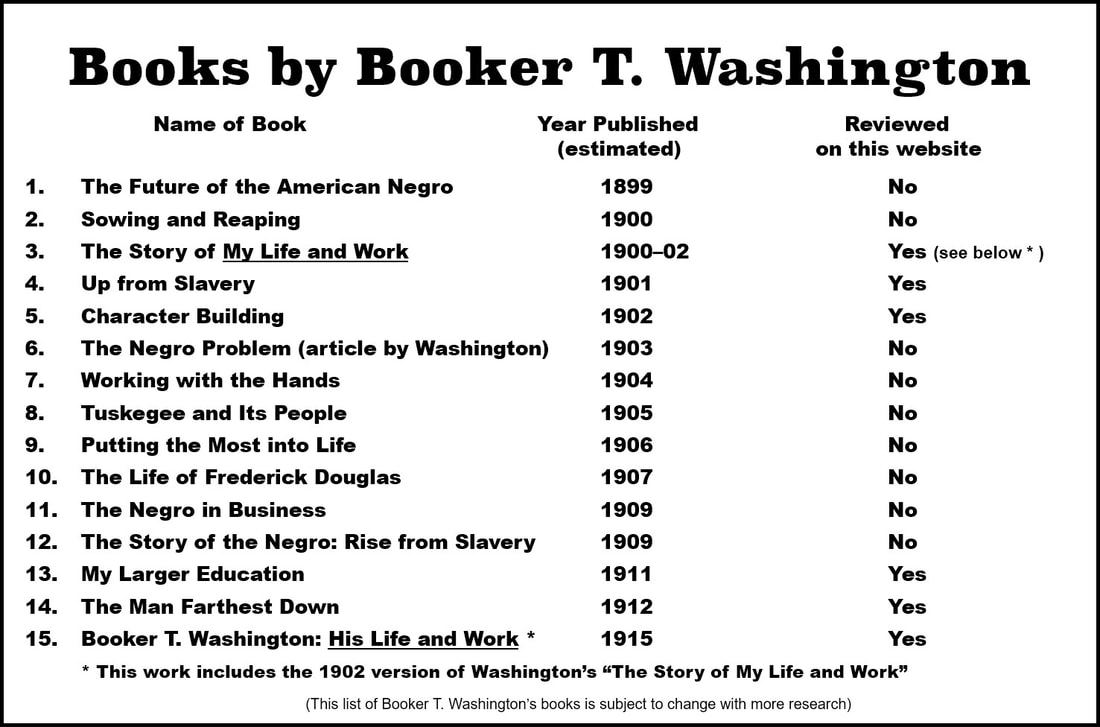Booker T. Washington's Home Page
|
|
Date Published: March 15, 2023
Date Modified: February 7, 2024 |
“The older I grow, the more I am convinced that there is no education which one can get from books and costly apparatus that is equal to that which can be gotten from contact with great men and women. …
- The education that I received at Hampton out of the text-books was but a small part of what I learned there. One of the things that impressed itself upon me deeply … was the unselfishness of the teachers.
- At Hampton, for the first time, I learned what education was expected to do for an individual. … I got my first taste of what it meant to live a life of unselfishness, my first knowledge of the fact that the happiest individuals are those who do the most to make others useful and happy.”
Booker T. Washington, Up from Slavery
Booker T. Washington: Author, Public Speaker and Educator Home Page
Booker T. Washington: Discovering A Great American Author, Educator and Public Speaker
- An Insight into Booker T. Washington’s Political and Human Style of Leadership
- Links to Reviews of Booker T. Washington’s Books
- Up from Slavery: 1900
- Character Building: 1902
- My Larger Education: 1910–11
- The Man Farthest Down: 1911–12
- Complete List of Works by Booker T. Washington
An Insight into Booker T. Washington’s Political and Human Style of Leadership
Ray Stannard Baker in Following the Color Line wrote about the balance between the approaches of Booker T. Washington, W. E. B. Dubois, and William Monroe Trotter—the latter of which some today position as the antithesis of Washington:
|
“In a former chapter I showed how the Negroes of the country are divided into two parties or points of view, the greater led by Booker T. Washington, the lesser by W. E. B. DuBois. Washington’s party is the party of the opportunist and optimist, which deals with the world as it is: it is a constructive, practical, cheerful party. It emphasizes duties rather than rights.
"Dr. DuBois’s party, on the other hand, represents the critical point of view. It is idealistic and pessimistic: a party of agitation, emphasizing rights rather than duties. “But these two points of view are by no means peculiar to Negroes: they divide all human thought; and the action and reaction between them is the mode of human progress.” [See Footnote #1]
Ray Stannard Baker, Following the Color Line
|
Booker T. Washington books available through Tuskegee Institute as of 1918. A complete list of Booker T.'s books is below.
|
Links to Reviews of Booker T. Washington’s Books
- Up from Slavery: 1900
|
"Much of what I have said has been written on board trains, at hotels or railroad stations while I have been waiting for trains, or during the moments that I could spare from my work while at Tuskegee.”
Booker T. Washington, “Preface,” Up from Slavery
|
- Character Building: 1902
“The speaker [Booker T. Washington] has put into them his whole moral earnestness, his broad common-sense and, in many places, his eloquence. Many of Mr. Washington’s friends have said that some of these addresses are the best of his utterances.”
Publisher, “Foreword,” Character Building
|
- My Larger Education: 1910-11
|
"And in overcoming those difficulties and mastering those problems, they have gained strength of mind and a clearness of vision that few persons who have lived a life of ease have been able to attain.
“Experience has taught me, in fact, that no man should be pitied because, every day in his life, he faces a hard, stubborn problem, but rather that it is the man who has no problems, to solve, no hardships to face, who is to be pitied.” Booker T. Washington, My Larger Education
|
- The Man Farthest Down: 1911-12
|
"The man farthest down in Europe is woman. Women have the narrowest outlook, do the hardest work, stand in greatest need of education, and are farthest removed from influences which are everywhere raising the level of life of the European people."
Peter E. Greulich, "Book Review," October 2023
|
- Booker T. Washington's Own Story of His Life and Work: 1915
|
This is an easy book to read. The chapters flow in chronological sequence and tend to be short, covering a single topic. Large portions of some chapters contain Booker T. Washington’s speeches. These speeches help the reader understand Mr. Washington’s candor and thought processes on the many issues of his day.
Peter E. Greulich, "Book Review," February 8, 2024
|
A Complete List of Works by Booker T. Washington with Dates Published *
|
|
Booker T. Washington's Own Story of His Life and Work (1915)
(This work includes the 1902 version of Washington's "The Story of My Life and Work.")
(This work includes the 1902 version of Washington's "The Story of My Life and Work.")
* This list of Booker T. Washington's books is subject to change with more research.
Footnote #1: Ray Stannard Baker wrote the following of William Monroe Trotter, his newspaper the Guardian, and their position on Booker T. Washington:
This author would suggest that any reader who wishes to understand the complexity of the social environment faced by Booker T. Washington during his lifetime, should consider reading Ray Stannard Baker’s fabulous work: Following the Color Line. Ray Stannard Baker was one of the top three, recognized muckrakers of his day and a credible, worthy source of information.
- “The chief, and at present almost the only, newspaper exponent of the radical Negro point of view is the Boston Guardian, published by William Monroe Trotter. … The Guardian is as violent and bitter in some of its denunciations as the most reactionary white paper in the South. It would have the North take up arms again and punish the South for its position on the Negro question. It breathes the spirit of prejudice. …
"Another leading activity is its fight on Booker T. Washington and his work. Denouncing Washington as a ‘notorious and incorrigible Jim Crowist,’ it says that he ‘dares to assert that the best way to get rights is not to oppose their being taken away, but to get money.’ "
This author would suggest that any reader who wishes to understand the complexity of the social environment faced by Booker T. Washington during his lifetime, should consider reading Ray Stannard Baker’s fabulous work: Following the Color Line. Ray Stannard Baker was one of the top three, recognized muckrakers of his day and a credible, worthy source of information.
